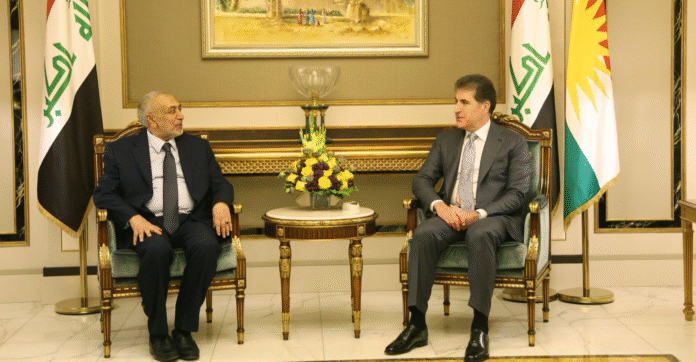President Nechirvan Barzani affirmed that resolving the salary crisis will help all Iraqis. He called for legal dialogue and mutual respect. During a public statement, he welcomed progress in talks between Baghdad and Erbil.
Barzani stressed the value of creating a clear roadmap for settling salary issues. He emphasized that leaders must treat salary payments as a national priority. He also urged all parties to uphold the constitution and avoid political interference.
During the same day, President Barzani met with Speaker of Parliament Mahmoud al-Mashhadani. Both officials agreed on practical first steps to tackle the salary problem. Al-Mashhadani explained that the Iraqi Parliament will back any solution that ensures stable payments. He confirmed Parliament’s readiness to work closely with the executive branch.
Meanwhile, the federal delegation also spoke with Kurdish leader Masoud Barzani and Prime Minister Masrour Barzani. They both called for full separation of salary payments from politics. They asked the federal government to take concrete steps, not just offer promises.
Salary delays continue to stir tensions between Baghdad and the Kurdistan Regional Government (KRG). Disputes also include oil revenue control, constitutional responsibilities, and federal budget sharing.
The KRG maintains that it met all obligations outlined in earlier deals. It continues to export oil through SOMO, Iraq’s state oil company. The region also sends the earned revenue to the central treasury in Baghdad. Despite this, officials in Erbil accuse Baghdad of failing to send back the region’s share of federal salaries.
These developments suggest a shift toward stronger cooperation. Leaders on both sides now appear more willing to resolve disagreements. A long-term plan will require trust and accountability from both Erbil and Baghdad. The Kurdistan Region insists that transparency and legal agreements must guide future decisions.
As talks move forward, officials hope to finalize a full agreement that guarantees regular salary payments. This goal may ease broader tensions between the region and the federal government. A fair and lasting solution could improve public trust and strengthen Iraq’s political framework.

